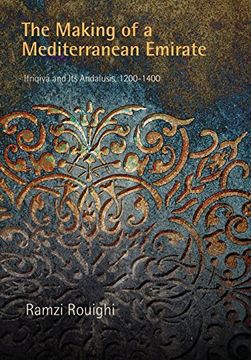Compartir
The Making of a Mediterranean Emirate: Ifriqiya and its Andalusis, 1200-1400 (The Middle Ages Series) (en Inglés)
Ramzi Rouighi (Autor)
·
Univ Of Pennsylvania Pr
· Tapa Dura
The Making of a Mediterranean Emirate: Ifriqiya and its Andalusis, 1200-1400 (The Middle Ages Series) (en Inglés) - Ramzi Rouighi
$ 120.472
$ 150.589
Ahorras: $ 30.118
Elige la lista en la que quieres agregar tu producto o crea una nueva lista
✓ Producto agregado correctamente a la lista de deseos.
Ir a Mis Listas
Origen: Estados Unidos
(Costos de importación incluídos en el precio)
Se enviará desde nuestra bodega entre el
Viernes 14 de Junio y el
Viernes 28 de Junio.
Lo recibirás en cualquier lugar de Argentina entre 1 y 3 días hábiles luego del envío.
Reseña del libro "The Making of a Mediterranean Emirate: Ifriqiya and its Andalusis, 1200-1400 (The Middle Ages Series) (en Inglés)"
The thirteenth century marks a turning point in the history of the western Mediterranean. The armies of Castile and Aragon won significant and decisive victories over Muslims in Iberia and took over a number of important cities including Cordoba, Seville, Jaen, and Murcia. Chased out of their native cities, a large number of Andalusis migrated to Ifrīqiyā in northern Africa. There, a newly founded Hafsid dynasty (1229-1574) welcomed members of the Andalusi elite and showered them with honors and high positions at court.While historians have tended to conceive of Ifrīqiyā as a region ruled by the Hafsids, Ramzi Rouighi argues in The Making of a Mediterranean Emirate that the Andalusis who joined the Hafsid court supported economic arrangements and political relationships that effectively prevented regional integration from taking place during this period. Rouighi examines an array of documentary, literary, and legal sources to argue that Ifrīqiyā was integrated neither politically nor economically and that, consequently, it was not a region in a meaningful sense. Through a close reading of narrative sources, especially historical chronicles, Rouighi further argues that the emergence in the late fourteenth century of the political ideology of Emirism accounts for the representation of the rule of the Hafsid dynasty over cities as its rule over the whole of Ifrīqiyā. Setting the activities of Andalusis such as the celebrated historian Ibn Khaldūn (1332-1406) in relation to specific political, economic, and intellectual developments in Ifrīqiyā, The Making of a Mediterranean Emirate proposes a counter to the dynastic-centric view of the period that pervades medieval sources and continues to inform most modern generalizations about the Maghrib and the Mediterranean.
- 0% (0)
- 0% (0)
- 0% (0)
- 0% (0)
- 0% (0)
Todos los libros de nuestro catálogo son Originales.
El libro está escrito en Inglés.
La encuadernación de esta edición es Tapa Dura.
✓ Producto agregado correctamente al carro, Ir a Pagar.

